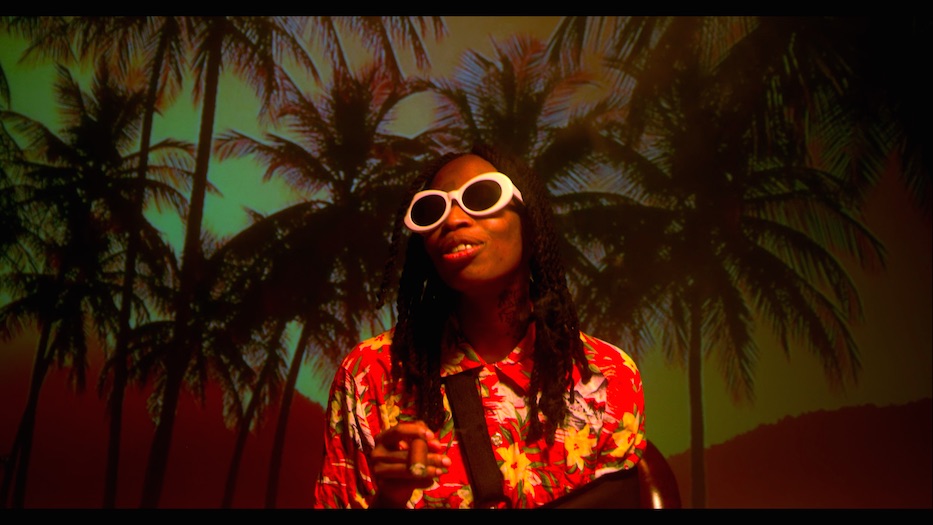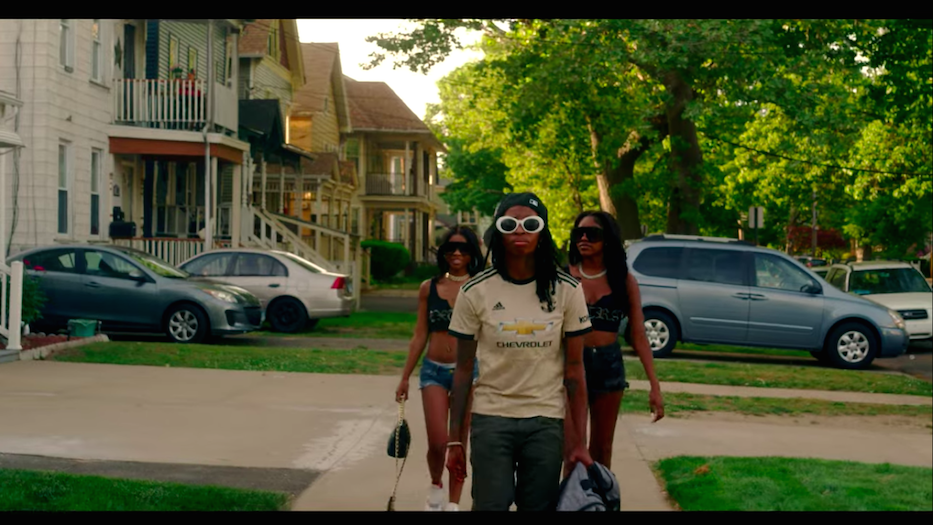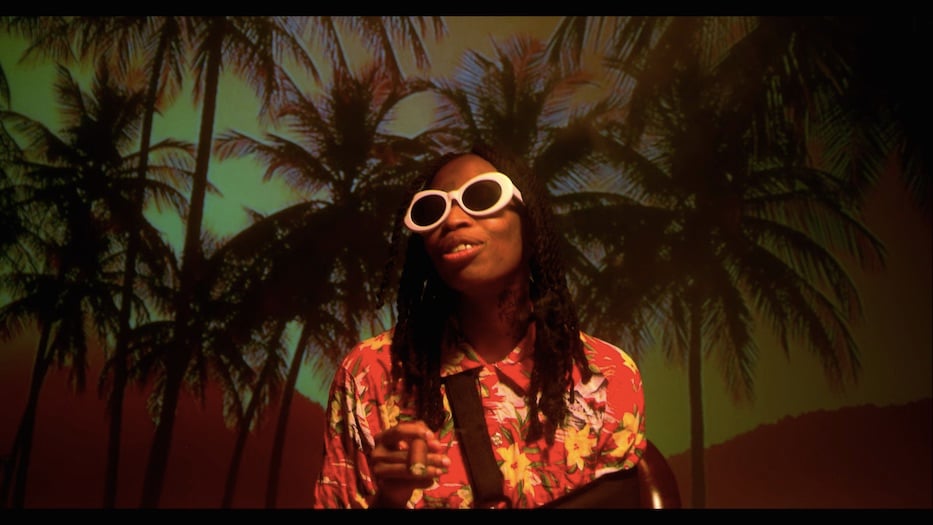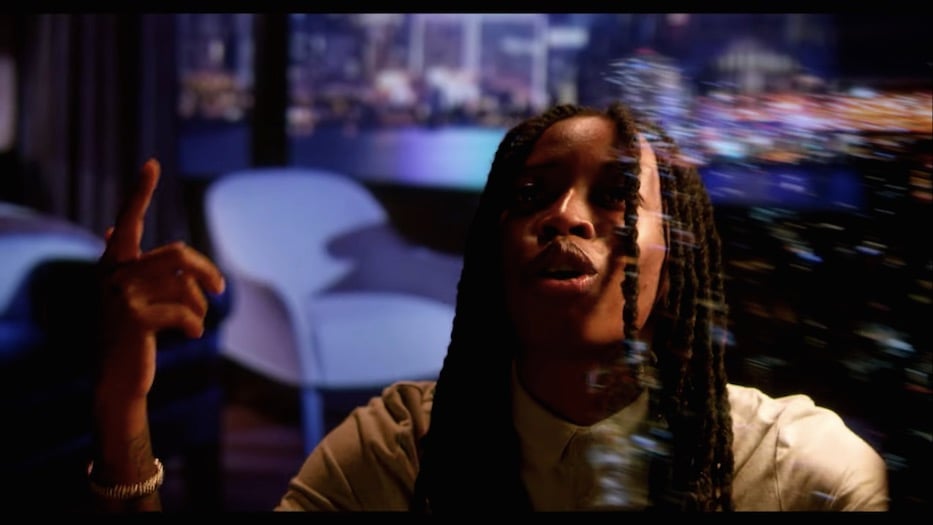
Music | Arts & Culture | The Hill | COVID-19

Screenshots from video.
The camera opens on a New Haven street, Snowsa making a break for it as the sun filters through the trees. There’s smooth, velvety sax in the background. She carries a bag, its weight swinging like a pendulum in one hand. Her legs pick up speed. Her carriage lifts as she makes it down the block and into an old getaway car. In the next shot, she’s talking to someone, and for a moment we can’t see who it is. One thing is clear: she’s the one in charge.
“Paradise” is the latest release from Snowsa, the New Haven-based rapper formerly known as Snowprah. Produced by Sam Hadelman and directed by Kevin Mezick, it is both a celebration of the artist’s craft and an ode to New Haven’s Hill neighborhood, where she grew up. By its conclusion, it also manages to fold in a love letter to twentieth-century crime dramas that she still finds herself coming back to.
“It honestly was a dream come true,” she said in a recent phone call from Atlanta, where she now spends some of her time. “It's a video to a song I always wanted to do. I always felt like the Hill was paradise, like New Haven was paradise. Paradise is whenever you're home.”

The concept for the video straddles five years, two countries, multiple late-night conversations squeezed into cars, and just as many filming locations. In 2016, the artist met the producer Ollie Twist while she was visiting family in Jamaica. Twist lives and works in London and New York; Snowsa is based in New Haven and increasingly Atlanta. Their budding collaboration birthed a mix called “Freak Like Me” under the moniker Jungle Sound. Then it sat there, waiting.
In New Haven, Snowsa went on to produce Yank Riddim, a 2018 track for which she made a video bursting with her love for New Haven. In 2019, the New York-based rapper Young M.A. reached out to the artist to do a remix on the song. While the two were filming, Snowsa met Hadelman, then a bright-eyed music geek who was writing for the New Haven Independent and spending the summer at its low-power radio station, WNHH-LP.
At the time, Hadelman—who now hosts a radio show himself and is the editor of Cut/Break Magazine—described Snowsa as “on the cusp of stardom.” She had just signed with Island Records. Her family came to watch the video shoot and cheer her on. After Hadelman covered production of the video, the two stayed in touch. Around that time, she and Twist also reconnected, and she decided to do something with their old tracks. After working it into “Paradise,” she started dreaming about what a video might look like.
Then the pandemic hit. Gigs dried up overnight, a sudden shift that she said she’s still bouncing back from a year later. The artist left Island Records for a variety of personal reasons, “and just I started rebuilding.” She and Hadelman kept talking about a video. In the spring of this year, he pulled in Mezick, a former classmate from Hamden Hall who was working as a filmmaker. Mezick, who knew Snowsa’s work from years of listening to Hot 93.7 in the car, “was flattered,” he said.
In May of this year, the three of them ended up in the back of a car in the Hill, talking for hours about movies, about life, and about what a video could look like. At one point, Mezick started flipping through his mental catalogue of films (“I’m kind of a cinephile,” he laughed). He mentioned his love for Boaz Yakin’s Fresh.
“Snow was like, ‘Someone like you shouldn't know what Fresh is,’” he recalled. It was an opening. They compared notes on Hype Williams’ Belly, then moved on to other films from the 1980s and 1990s.
“And then somewhere in the mix, ‘Paradise’ gets played for the first time,” Mezick recalled. “All the wheels started to turn. I was seeing Scarface in my head. I was seeing New Jack City in my head. It was something that we were trying to nail down.”

Snowsa told Hadelman and Mezick that she knew she wanted the video to tell the story of a robbery—she had always seen some form of that opening shot of herself running down the street. She loved the dramas and thrillers that kept her on her toes. The three riffed on films including King of New York, New Jack City, Pulp Fiction and Scarface, nods to all of which made it into the final video.
Mezick started sketching out ideas. His friend and colleague Kewan Harrison, a filmmaker for whom Mezick reserved the highest praise, jumped onboard for free as the director of photography. With a crew that grew to six, the group storyboarded, prepared shots, and put together a wardrobe department. Hadelman joked that the video was “about 80 percent my brainchild and about 70 percent my clothing.”
“I've worked my hardest and I started at the thing for hours on end, day after day,” Mezick said. “You stop realizing how it actually looks. But ever since it's come out, it's been such a great reception. It’s something for me and Sam.”
In the final cut, the artist puts her own spin on a robbery, giving back to her neighborhood and her neighbors in the process. As she flows seamlessly through each bar—and through physical spaces, with transitions that are silky smooth—New Haven is a prominent character. While some of the video was shot in Hamden, it’s her love for the Elm City that shines through, a bright light even in the bluest-black of night shots.
While most of her family is in Bridgeport, her mom and niece still live in the Hill. The neighborhood—which gets a bad rep, but is thick with neighborly love, she said—announces itself in a map of the city and unfolds by foot, by car, and in the pumping arms of neighbors who greet her joyously when she walks down the block.
Her neighbor does backflips down the street. A baby turns it into a multigenerational party. Meanwhile, Harrison’s eye makes it feel crisp and vintage at the same time, with shots that revel in the flip of a wrist or the way that smoke curls upward. When she beams slyly right into the camera, it doesn’t feel like it could end any other way.
Since the video dropped, Mezick said that he and Hadelman have received some love for their production company, Saturday Mornings. Snowsa, meanwhile, said she sees it as both a homecoming and a sign “that I don't give up.” It’s part of her process of rebuilding and reinventing herself.
“We all over here appreciating the Hill so much,” she said. “This is paradise, and this is also a hood that can take your life. Growing up, I didn't realize what I was coming from. I like to show where I'm from and how I be showing up there.”

